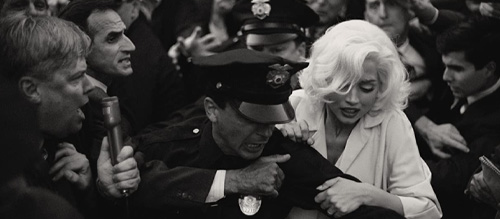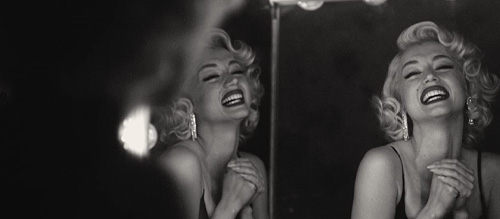Blonde (2022)
Director: Andrew Dominik
Screenwriters: Andrew Dominik
Starring: Ana de Armas, Adrien Brody, Bobby Cannavale, Xavier Samuel, Julianne Nicholson
Blonde is the story of Marilyn Monroe behind the scenes, or so the film would have you believe. From her troubled childhood beginnings with a mother gone mad and murderous from the abandonment of Monroe’s father, Norma-Jean rises to stardom through Hollywood’s corrupt and perverted underside, never quite finding happiness or peace, and Marilyn Monroe’s true, traumatic world is revealed.
Except it’s not.
Ana de Armas, for what it’s worth, gives the performance of a lifetime, truly embodying this presentation of one of the most famous women in the world; naïve, unhappy, and lost. She has the nuance, the persona, the heartbreak, and there’s no doubt that the awards will come for her.
The other idea mainly of note is director Andrew Dominik’s experimentation with colour and aspect ratio. Jumping from 1:1 to 2.35:1 aspect ratios, then to black and white, then back to colour, then all around again, both keeps one on their toes whilst watching, and makes one fundamentally unnerved. We’re so used to watching something in a single format, that bringing attention to the artificiality of the medium is both disturbing and reflects the artificiality of the film industry, the society which rule and inhabit it, and the mask of Marilyn Monroe which Norma Jean puts on. From that point of view, it’s an interesting experiment. Dominik wants to make you uncomfortable, and with that he succeeds.
Whether uncomfortableness results in a successful film however, one that manages to accomplish its goals, whatever its goals may be (because this film’s presentation, at least, doesn’t seem to know) is another question. If the intention was to present a fictional view of Monroe as someone hopelessly naïve, endlessly accepting of abusive relationships, and far less intelligent than the actual person was, then it has succeeded. If the intention was to take the basic premise of ‘Marilyn seems happy with new partner, gets pregnant, partner leaves, she loses child, is unable to learn from this,’ and rinse-and-repeat it for a good four or five times over two and a half hours, thereby presenting nothing new after the 1hr mark, then it has succeeded.

If this dull monotony of trauma, which the film slips into with apparent ease, is intended to represent the never-ending cycle of abuse women face every day, and how the world simply learns to accept it, then bravo. Perhaps. But what a shame that the place which could be used as a rallying cry descends into a clock-watching exercise that even the bright shine of de Armas can’t override. It is a film using a real woman to sensationalise absolutely nothing of substance for far longer than it should do. When Dominik could be trying to find new ways to continuously show the shocking, abhorrent reality below the surface of the glitz and glamour, he rests on dull, uninteresting presentations of moments already seen, and his film therefore reveals itself as 160 minutes of stylised trauma told by a robot.
Had this been half as long, with the character of Marilyn Monroe substituted for a 100% fictional character, it would be short, brutal, shocking, and all the more effective. As it is, Blonde basks in its self-importance, revels in its sensationalist presentation, and all for seemingly no reason at all. By all means watch Blonde for Ana de Armas’ astounding performance, but be aware that she finds herself in a film that completely wastes not only her potential, but also Marylin Monroe’s.
Score: 10/24


